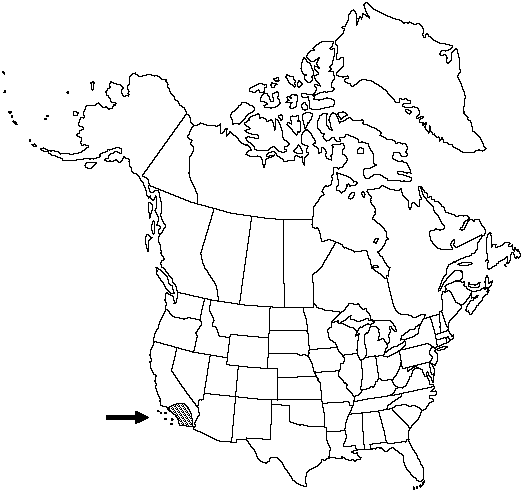Cheilanthes newberryi
Biblioth. Bot. 20(85): 133. 1915.
Stems short-creeping to compact, usually 3–5 mm diam.; scales uniformly dark-brown to black or with light-brown, ephemeral tip, linear-subulate, slightly contorted, strongly appressed, persistent. Leaves clustered, 5–30 cm; vernation noncircinate. Petiole dark-brown, rounded adaxially. Blade lanceolate to linear-oblong, 2-pinnate-pinnatifid to 3-pinnate at base, 1.5–5 cm wide; rachis rounded adaxially, lacking scales, with dense monomorphic pubescence. Pinnae not articulate, dark color of stalk continuing into pinna base, basal pair slightly smaller than adjacent pair, ± equilateral, proximal basiscopic pinnules slightly enlarged, appearing tomentose adaxially. Costae green or straw-colored adaxially for most of length; abaxial scales absent. Ultimate segments oblong to lanceolate, not beadlike, the largest 3–5 mm, abaxially densely woolly with very fine, cobwebby hairs, tomentose adaxially. False indusia absent. Sori usually discontinuous, concentrated on small apical and lateral lobes. Sporangia containing 64 or 32 spores. 2n = 60.
Phenology: Sporulating late spring–summer.
Habitat: Rocky cliffs and slopes, usually on igneous substrates
Elevation: 0–1200 m
Distribution

Calif., Mexico in Baja California
Discussion
As with Cheilanthes bonariensis, C. newberryi has traditionally been assigned to Notholaena; R. M. Tryon and A. F. Tryon (1982) argued for its placement in Cheilanthes. Hybridization of C. newberryi with C. covillei to form C. × fibrillosa supports placement in Cheilanthes. R. M. Tryon (1956) reported variations in spore number per sporangium in C. newberryi that may indicate cytologic variability within the species.
Selected References
None.
Lower Taxa
"fine" is not a number.